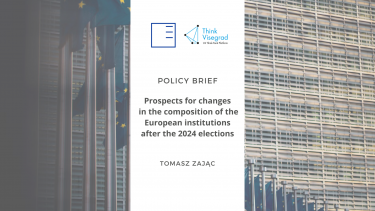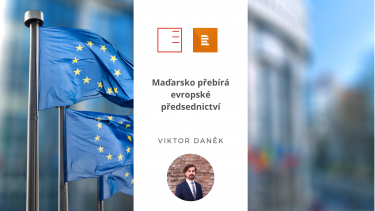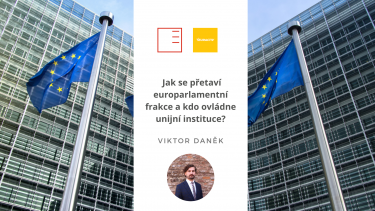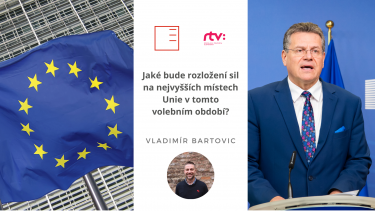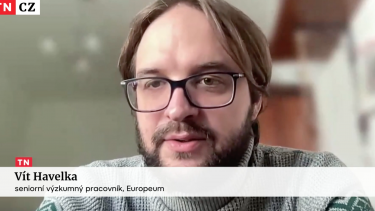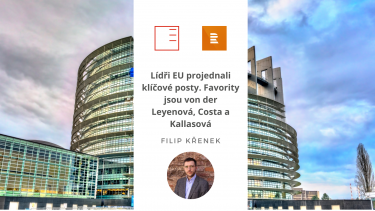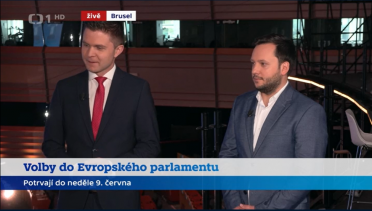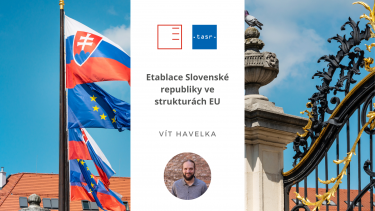Policy Brief | Prospects for changes in the composition of the European institutions after the 2024 elections
This policy brief analyses the prospective changes in the European Parliament (EP) composition following the 2024 elections. It reflects on the evolving political environment since 2019, highlighting shifts in party dynamics within the EP, such as the fragmentation of traditional party dominance and the emergence of new political alignments. Additionally, it explores potential reconfigurations in top EU positions post-elections and examines ongoing concerns regarding geographical representation within EU institutions, particularly the European Commission. Writes Tomasz Zając from the Polish Institute of International Affairs (PISM).
Zjistit vícePolicy Brief | Vyhlídky na změny ve složení evropských institucí po volbách v roce 2024
Publikace analyzuje možné změny ve složení Evropského parlamentu po volbách v roce 2024, zamýšlí se nad vývojem politického prostředí od roku 2019 a poukazuje na posuny ve stranické dynamice, jako je roztříštění tradiční stranické dominance a vznik nových politických uskupení. Kromě toho zkoumá možné změny v obsazení vrcholných pozic v EU po volbách a zabývá se přetrvávajícími obavami ohledně geografického zastoupení v institucích EU, zejména v Evropské komisi. Píše Tomasz Zając z Polského institutu mezinárodních vztahů (PISM).
Zjistit víceTA3 | Questions about the Hungarian Presidency
Make Europe Great Again is the motto of the Hungarian Presidency of the Council of the European Union. Hungary has set seven priorities, including fighting illegal migration and strengthening European defense. But the next six months raise many questions about the direction the Union will take under Budapest's leadership and what it will mean for Ukraine. Žiga Faktor, deputy director and head of the Brussels office of EUROPEUM Institute, explains the situation for Slovak TV TA3.
Zjistit více
ČRo Plus | Hungary takes over the European Presidency. How will the country considered to be the EU's troublemaker handle it?
Hungary took over the EU presidency today, giving Budapest, perceived as a troublemaker in the European institutions, a different role for six months. At the same time, Prime Minister Viktor Orbán announced over the weekend the formation of a new alliance in the European Parliament with the Czech ANO movement and the Freedom Party of Austria. Viktor Daněk, deputy director of EUROPEUM Institute, comments on the formation of the new alliance.
Zjistit víceEuractiv.cz | Post-election reshuffles. How will the European Parliament factions transform and who will dominate the EU institutions?
The key issues for the new term in the EU do not end with the European elections. Forces in European Parliament continue to shift depending on factions, while leaders select institutional leadership. How will the elections and the composition of the European Parliament influence the future functioning of the EU? And who will lead it? Viktor Daněk, Deputy Director of EUROPEUM Institute, answered these questions for Euractiv.cz.
Zjistit víceRTVS | What will be the balance of power at the top positions of the Union?
After the European Parliament elections, government leaders of the EU member states must agree on the leadership of the European institutions. The agreement must be finalized by the end of the month. Vladimír Bartovic, President of EUROPEUM Institute, answered questions about the negotiations.
Zjistit víceTV Nova | Personnel Changes in European Institutions
After the European elections, institutions in Brussels are facing personnel changes. Who is likely to assume the most important positions, namely the the head of the European Council, the European Commission, and the European Parliament? Vít Havelka, senior researcher at EUROPEUM Institute, commented on this in the main evening broadcast on TV Nova.
Zjistit více
ČRo Plus | EU leaders discuss key positions. The favorites are von der Leyen, Costa, and Kallas
On Monday 17 June, the leaders of the European Union Member States headed to Brussels for their first joint meeting after the European Parliament elections. They discussed the distribution of key posts at the head of the EU institutions - the President of the European Commission, the European Council and the European Parliament. Filip Křenek, project coordinator and analyst at EUROPEUM Institute, commented on the likely distribution of forces for ČRo Plus.
Zjistit více
ČT24 | The European Union is in a state of unity, despite differences among some member countries
The European Parliament elections held from June 6th till 9th not only introduced a new lineup of MEPs but also brought significant changes in the distribution of seats among various countries. The European Union is gearing up for new challenges with its new leadership, and Hungary will assume the presidency in July. How will the European institutions transform, and what priorities will dominate over the next five years? Žiga Faktor, Deputy Director and Head of the Brussels Office of EUROPEUM Institute, commented for Czech Television.
Zjistit více
TASR | Establishment of the Slovak Republic in the EU structures
Twenty years ago, the European Union underwent its biggest enlargement with the addition of ten Central and Eastern European countries. According to Vít Havelka, Senior Research Fellow at EUROPEUM Institute, this is enough time for all accession countries to learn how to navigate the EU institutions and its decision-making process.
Zjistit více
Staroměstské náměstí 4/1
Praha 1 - Staré Město
110 00
tel.: +420 212 246 552
email: europeum@europeum.org
https://www.europeum.org
